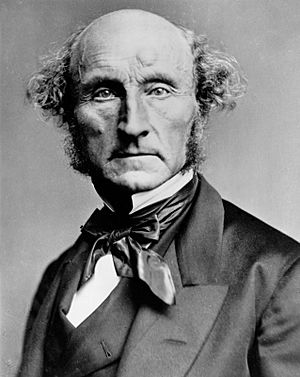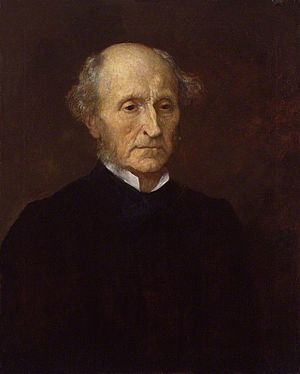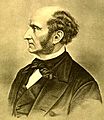John Stuart Mill facts for kids
Quick facts for kids
John Stuart Mill
|
|
|---|---|

Mill c. 1870
|
|
| Member of the British Parliament for City and Westminster |
|
| In office 25 July 1865 – 17 November 1868 |
|
| Personal details | |
| Born | 20 May 1806 Pentonville, London, England |
| Died | 8 May 1873 (aged 66) Avignon, France |
| Political party | Liberal |
| Spouse | |
| Alma mater | University College, London |
|
Philosophy career |
|
| Era | 19th-century philosophy Classical economics |
| Region | Western philosophy |
| School | Empiricism, utilitarianism, psychologism, classical liberalism |
|
Main interests
|
Political philosophy, ethics, economics, inductive logic |
|
Notable ideas
|
Public/private sphere, hierarchy of pleasures in utilitarianism, rule utilitarianism, classical liberalism, early liberal feminism, harm principle, Mill's Methods, direct reference theory |
|
Influences
|
|
|
Influenced
|
|
| Signature | |
John Stuart Mill (born May 20, 1806 – died May 8, 1873) was an important British thinker. He was a philosopher (someone who studies big ideas), a political economist (someone who studies how countries manage money and resources), and a civil servant (someone who works for the government). People often call him J. S. Mill.
Mill was one of the most influential thinkers in the history of liberalism. This is a political idea that supports individual rights and freedoms. He wrote a lot about social theory (how societies work) and political theory (how governments should work). He also wrote about political economy, which combines politics and economics.
Many people say he was the most important English-speaking philosopher of the 1800s. Mill believed strongly in liberty, which means freedom. He argued that individuals should be free from too much control by the government or society.
He was a supporter of utilitarianism. This is an ethical idea that says the best action is the one that brings the most happiness to the most people. Jeremy Bentham first developed this idea. Mill also studied scientific methodology, which is how scientists do their research.
Mill was a member of the Liberal Party. He was also the first Member of Parliament to ask for women's suffrage. This means he wanted women to have the right to vote.
Contents
Biography of John Stuart Mill
John Stuart Mill was born on May 20, 1806, in Pentonville, London, England. He was the oldest son of James Mill, who was also a famous philosopher, historian, and economist. His mother was Harriet Burrow.
Mill's Early Education
John Stuart was taught at home by his father. His father got advice from other important thinkers like Jeremy Bentham. Mill had a very strict education. His father wanted him to become a very smart person, a "genius." He hoped John Stuart would continue to support the idea of utilitarianism.
Mill was kept away from other children his age, except for his brothers and sisters. This was so he could focus on his studies.
- At age three, he started learning Greek.
- By age eight, he had read many famous Greek books. These included Aesop's Fables and Anabasis. He also knew about famous Greek writers like Herodotus and Plato.
- He also read a lot of history in English. He learned arithmetic, physics, and astronomy.
When he was eight, Mill began studying Latin and algebra. He even became a teacher for his younger siblings. He read all the common Latin and Greek authors. By age ten, he could easily read Plato and Demosthenes. His father also made sure he studied and wrote poetry. In his free time, he enjoyed reading about natural science and popular novels. These included Don Quixote and Robinson Crusoe.
Working Life and Marriage
Mill could not study at the famous University of Oxford or University of Cambridge. This was because he did not agree with the rules of the Church of England. Instead, he followed his father to work for the East India Company. This company managed trade and government in India for Britain. He also attended University College, London. There, he listened to lectures on law.
In 1851, Mill married Harriet Taylor. They had been friends for 21 years before they married. His relationship with Harriet Taylor made him even more passionate about women's rights. He said she greatly influenced his book On Liberty. This book was published shortly after she died in 1858. She passed away from severe lung problems.
Time in Parliament
Between 1865 and 1868, Mill was the Lord Rector of the University of St. Andrews in Scotland. During the same time, from 1865 to 1868, he was a Member of Parliament (MP). He represented the area of City and Westminster for the Liberal Party. As an MP, Mill worked to help the people of Ireland.
In 1866, Mill made history. He was the first person in Parliament to ask for women to have the right to vote. He strongly defended this idea in later debates. Mill also supported other social changes. These included helping labour unions and farm cooperatives.
Later Life and Legacy
Mill was an agnostic. This means he believed that it's not possible to know if God exists.
John Stuart Mill died in 1873 in Avignon, France. He was buried there next to his wife. His ideas continue to influence how we think about freedom, rights, and society today.
Images for kids
-
Statue of Mill by Thomas Woolner in Victoria Embankment Gardens, London
See also
 In Spanish: John Stuart Mill para niños
In Spanish: John Stuart Mill para niños
 | Charles R. Drew |
 | Benjamin Banneker |
 | Jane C. Wright |
 | Roger Arliner Young |







